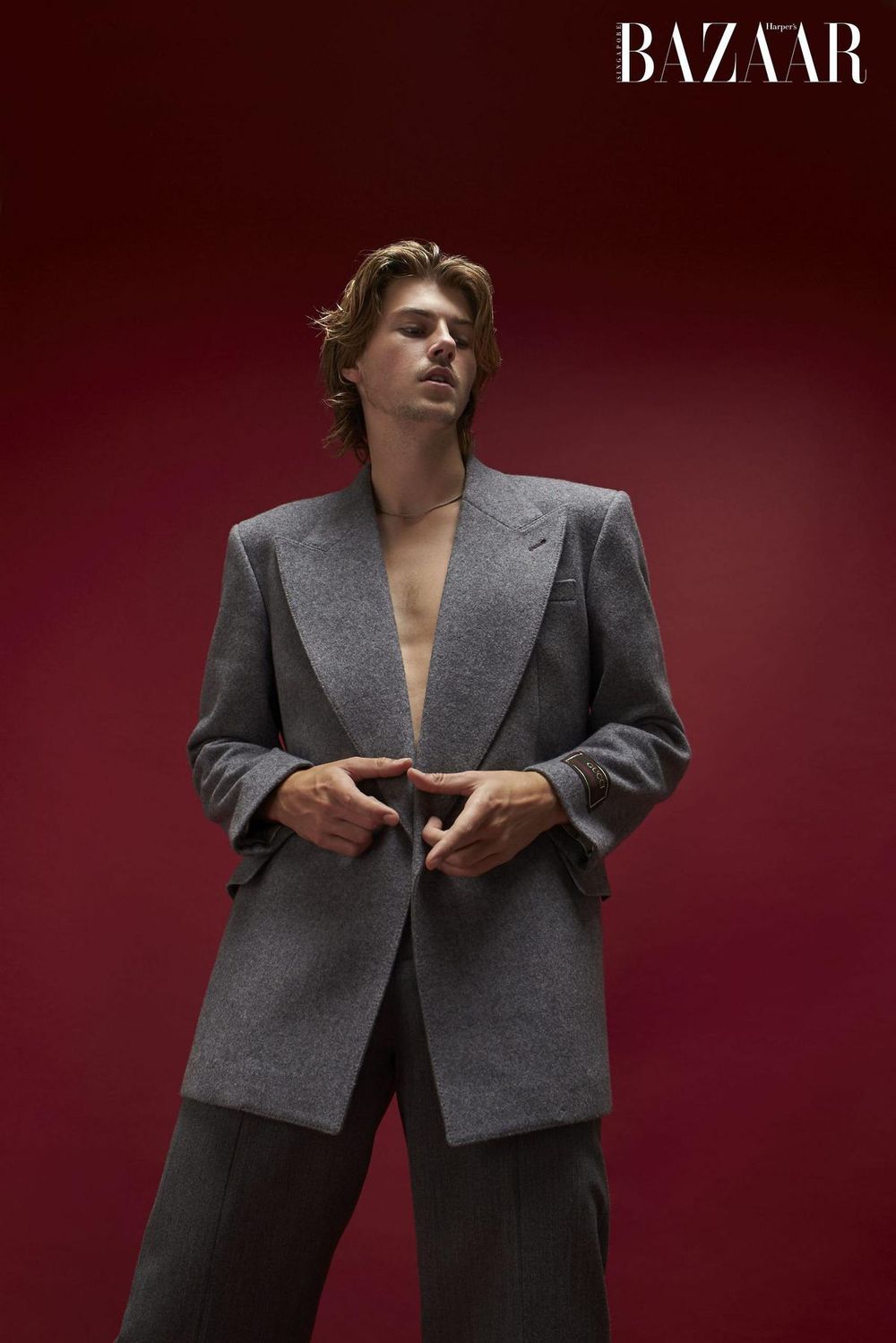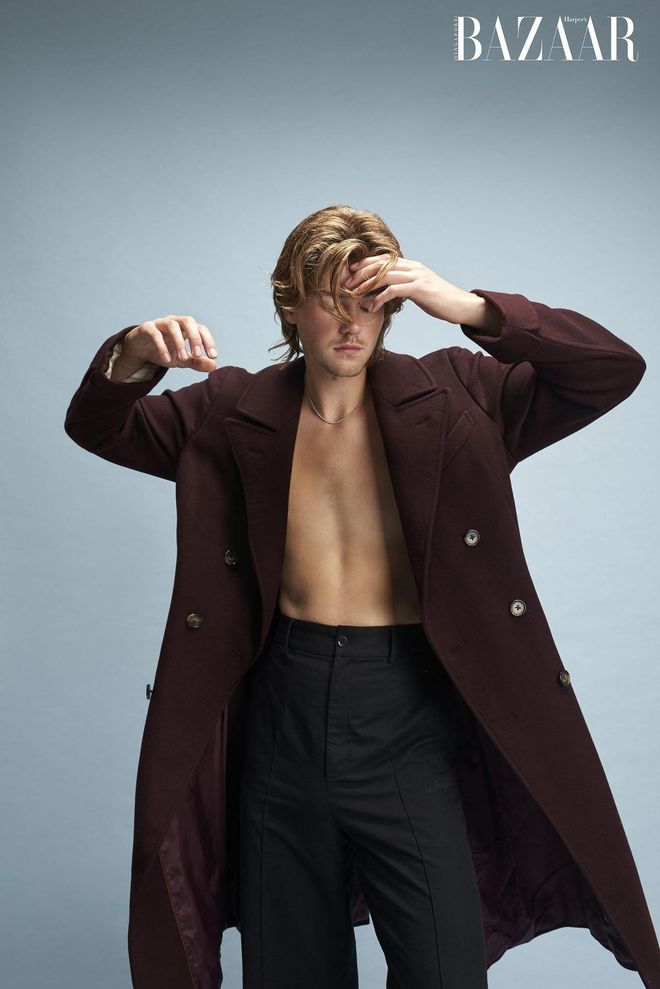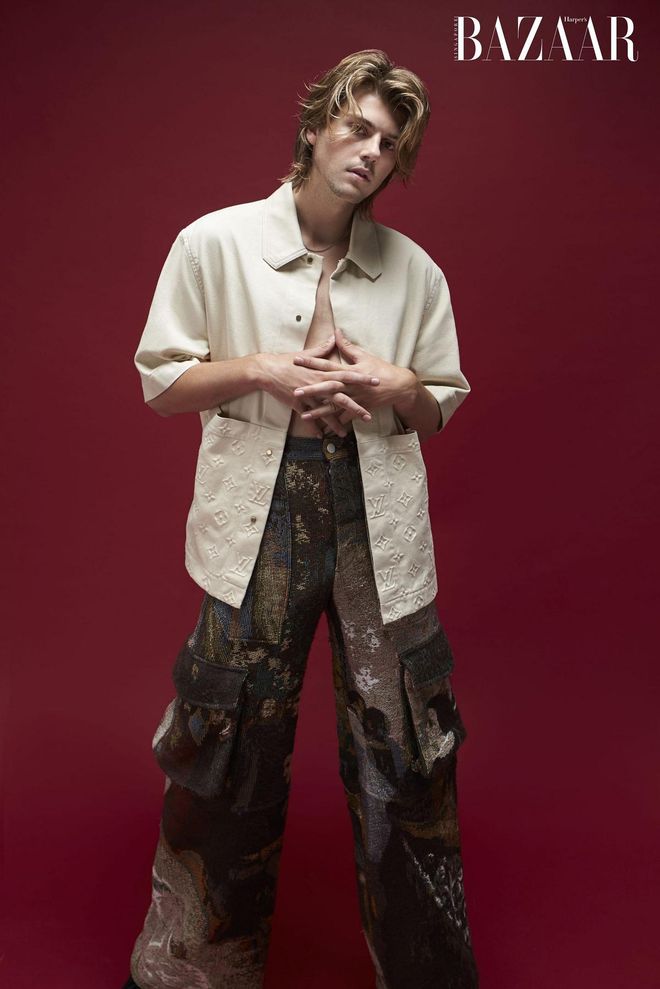In Conversation With British-Australian Singer And Songwriter Ruel
We caught up with the rising star while he was in Singapore to find out more about his new music, creative process, fashion musings and more.

In an age when uploading videos of yourself dancing to trending music on TikTok can almost certainly guarantee you your fifteen seconds of fame (literally and figuratively), how does one build a lasting legacy that transcends geographical and generational boundaries? Our answer is simple: Charisma, uniqueness, nerve, talent and authenticity. You might think of this as a tall order for an ordinary person, but British-Australian singer and songwriter Ruel Vincent van Dijk, better known by his mononym Ruel, is anything but—and he unquestionably possesses these qualities in spades.
Related article: Exclusive: Apo Nattawin Wattanagitiphat And Mile Phakphum Romsaithong On ‘KinnPorsche: The Series’ And More

Coat, Loro Piana. Trousers, Ruel's own. Photo: Athirah Annissa
In Conversation With British-Australian Singer And Songwriter Ruel
At just 20 years old, Ruel has garnered over one million followers on Instagram and more than 300 thousand followers on TikTok through his disarming personality, incredible musical talent and genuineness. He may be the scion of Ralph van Dijk, founder of Australian radio agency, Eardrum, but my one conversation with the Painkiller singer has convinced me that he’s definitely put in the work to achieve the success he now enjoys. And anyone who’s heard him sing live can definitely attest to his raw talent. During our photo and video shoot with the rising musical talent, we had the pleasure of hearing him sing acapella—no autotune needed.
Related article: Punk-rock Hitmaker LØREN On Style, Music And More
Related article: Boy Wonder Apo Nattawin Wattanagitiphat On His Journey Of Self-Discovery
And like his Gen Z peers, Ruel is unafraid of being vocal about causes close to his heart. In his case, it’s climate change, which should come as no surprise as the Sydney-based artist is a longtime surfer. And his travels with the Surfrider Foundation earlier this year, an organisation dedicated to protecting and preserving the world’s oceans, waves and beaches, has made him acutely aware of the current situation of climate change. This prompted him to release a song titled "Let the Grass Grow" about assuaging his fears and spotlighting his desires surrounding the subject.
Related article: Singaporean Rapper Yung Raja Talks Fashion, Identity And Growing Up In Little India
More recently, Ruel was in Singapore to host a meet and greet session with fans as well as an intimate performance. We caught up with the rising star to find out more about his new music, creative process and more.

Blazer, Gucci. Trousers, Louis Vuitton. Photo: Athirah Annissa
In Conversation With British-Australian Singer And Songwriter Ruel
How did your meet and greet go, and what was it like being able to perform live again?
It was great! It was so cool to see everyone that I haven't seen in about three years—people who came to my show in 2019, and people who didn't as well. It was my first time performing with just a guitar on a stripped-back set, so it was pretty scary not having a band to accompany me. But it was really fun in the end. I would like to do something like this again—just me and my guitar.
You started your career in music at a very young age. When did you discover you had a talent for music, how did you nurture it and did you have any concerns pursuing it professionally?
I don’t think there was an age where I thought: ‘Oh, yeah, I'm talented.’ I was never like that. It was a natural progression of opportunities that came my way and me taking them. I’ve worked hard, but I’ve also got a lot of amazing opportunities. And I was really lucky that I found the people that I did, and worked for the people that I did. I’ve been consuming music all my life, so I can't really pinpoint a specific time.
A huge part of my childhood was music playing around the house and the car—whatever it was, it was just constantly in the back of my head. And it was good music as well. So it was a massive part of my identity as a child. Most of the stuff that was playing was just a kind of compilation of David Brubeck albums. So constant jazz. But I don't know when I first started to really like the songs. I think it was probably James Morris. I think that he was kind of the first musician that I connected to on a personal level.
So when would you say you started making music?
I started writing songs for fun as a kid and I was maybe around 10 or 11. And then I started properly making music in a studio with other writers and was actually trying to make it good enough to release to the world when I was around 13 years old. It was also around that time when I met my manager, a producer and a bunch of people in the industry who wanted to help me and be part of my journey.
Tell us about your creative process, and where you draw inspiration from.
I don’t have a particular way. None at all. It's always a kind of in the moment thing where I don't really have any plan going into any sessions. I try to do the best that I can that day. For me, inspiration could come from someone playing the guitar and then finding a cool core progression to it. And me doing some melodies over it, talking about a concept and then writing the lyrics to those melodies with that concept. That's kind of the most basic way of doing it. But it can come from hundreds of things. I could be obsessed with a movie and want to write a soundtrack to it or you can have a beat completely made up. There's so many processes that I've done, and so there isn't just one that works.
Speaking of movies, is there one that you would’ve loved to have written a song for?
Fight Club. I think that would be pretty sick. Her by Joaquin Phoenix.
Your music videos are very conceptual—cinematic even. How involved are you in that process?
I kind of have a visual in mind for every song I finish. Then I send them to my creative director Grey Ghost, and he, without me saying anything, will have his first idea of what he saw when he heard the song. We would then get on a call and flesh everything out and try to make everything as epic as we can. We like to give the song a whole other life and a little universe to live in. And that's kind of what we've done for every music video.
Do you have a favourite music video of your own?
Probably Real Thing or Painkiller. I think those two music videos are really good. I love As Long As You Care as well.
Are there any film directors that you look up to?
Colour-wise, Wes Anderson. I love Spike Jones, Quentin Tarantino and Christopher Nolan, too.
You have an upcoming debut album. What can you tell us about it?
We're just talking about a lot of movies, and that really inspired it. Every emotion I was feeling during COVID and all those life experiences. When I was running out of experiences of myself to talk about, I turned to my favourite scenes from movies and tried to make the soundtrack for that scene, which was fun.
What was the pandemic like for you?
It was difficult. It was also some of my first times writing by myself and trying to make a full song, record and having my first go at producing as well. It was infuriating because I'm so bad at production. But it was amazing to actually be forced to write by myself, because everything came out so honestly. I wasn't filtering myself for anyone—it was just pure emotion. I wasn't holding back, and I was being super specific. And while I really love those songs, a lot of them won't make the album just because they feel so different sonically. I was so limited with my skills with production. Maybe it'd be like its own little EP that I'll put out when I'm 40 years old.
How would you describe your music in three words?
I’m so bad at this question. I've been asked this question so many times, and it's always a terrible answer: Emotional, youthful and misunderstood.
And then how would you describe yourself?
I think I can say the exact same.
What can we expect from your album?
I can't give away too much, obviously. Pretty uptempo, kind of fun songs, because that's just what I wanted to come out of the gates with. And I've also just had fun experimenting with depressive music. It's a compilation of emotions that I experienced during the pandemic.
Which of your songs hold the most significance for you?
It’ll probably be Let The Grass Grow. When I wrote this song, I was thinking about where I felt the world's heading towards. I've always felt too uneducated and just a little too naive on the subject. But climate change is such a clear problem in the world and such an obvious thing to get behind. And I wanted to put out a song and give it new meaning.
Why is tackling climate change important to you?
It's always been there. I’ve been fortunate enough to have grown up in a household that didn’t pretend climate change wasn’t happening, so it’s always been at the back of my mind. I've always thought about it. And I've always tried to do what I can. And I've not been very good at using my platform to combat it. I think I've just always felt too scared saying the wrong thing, because I don't know enough. I think that's probably why I hadn't done anything until now. So when this song came about, I felt super certain about what I was saying, and it felt like it was coming from an honest place.
What is your message to people when it comes to climate change?
Just do better. Everyone is going to have to sacrifice something. Spread the word. And if you have anyone in your life who is disagreeing with the fact that it's happening then do what you can to change their mind. I think that's kind of the most important—making sure that people know how severe the situation is.
What are three simple things you think that people can do at home to combat climate change?
When I was working with the Surfrider Organisation, they gave me a bunch of things to talk about and think about. If you live by nature and are just walking past and see rubbish, just pick it up. It’s super easy but makes such a huge difference if everyone starts to have that kind of instant reflex. There’s also energy conservation and using sustainable materials.
Let’s switch gears for a bit and talk about fashion. Is there someone you look up to in terms of style?
When I was like 15 or 16 years old, I wanted to wear everything that Tyler, the Creator was wearing. He's an absolute style icon, for sure. Eventually, I found my own sort of style which I would describe as tactile, classy and subtle. I like muted, earthy tones in sweaters and baggy pants. And fresh sneakers, for sure.
What have been your biggest personal and professional milestones this year?
A personal milestone for me was being able to tour again after so long. It’s such an amazing feeling. I hadn't had the feeling of a crowd singing back lyrics to me for so long. And seeing people react to my new music in a positive way was so special. Professionally, I got to host the ARIA Awards which is cool and pretty fun. It's like the Australian Grammys. Being asked to do things like this makes you feel special.
Now that you’ve finished your album, what’s next?
We're going to tour it and then write another one. That's kind of like every musician's schedule: Make an album, take some time off, make an album. There's no end goal here. There's no peak or one sort of achievement that I want to hit before I stop. I just want to keep doing it until I can’t.
*This interview has been edited and condensed for clarity.
Photographer: Athirah Annissa
Associate Fashion Director: Jeffrey Yan
Producer: Navin Pillay
Grooming: Manisa Tan using Chanel Beauty and Keune Haircosmetics